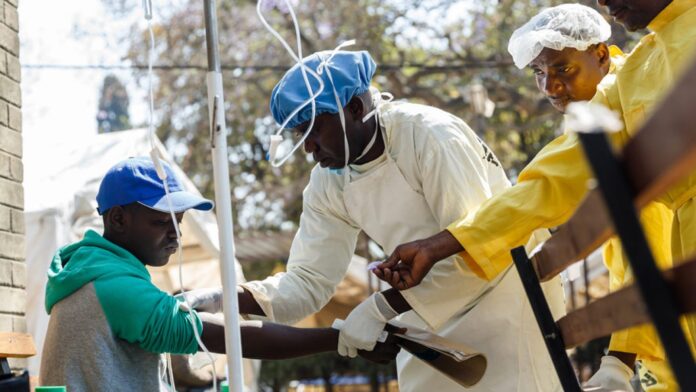As the cholera outbreak in Zamfara State worsens, the United States Centers for Disease Control and Prevention (US-CDC) and the African Field Epidemiology Network (AFENET) have deployed a rapid response team and delivered essential medical supplies to support the state’s efforts in curbing the disease.
According to a statement released on Friday by the Public Relations Officer of the Zamfara State Ministry of Health, Suleiman Isah, the outbreak, which started on January 15, 2025, has now affected all 14 local government areas of the state.
So far, the state has recorded over 11,000 confirmed cases, with a case fatality rate of 1.6%. The hardest-hit local governments include Talata Mafara, Gusau, Bungudu, and Zurmi, which together account for more than 60% of the reported cases.
Isah noted that worsening insecurity and the general humanitarian crisis in the state have made it more difficult to contain the outbreak. He described the situation as a major public health emergency that needs urgent attention and coordinated response from all stakeholders.
To boost the state’s response, AFENET and the US CDC have deployed a team of seven Field Epidemiology and Laboratory Training Programme (FELTP) residents and one graduate. These health professionals will spend 14 days in the most affected areas, where they will assist with disease surveillance, case management, data collection, and coordination with the State’s Public Health Emergency Operations Centre (PHEOC).
In addition to manpower, the response team delivered 29,500 medical supplies to the state government. These include 40,000 essential medicines, such as oral rehydration salts, Ringer’s lactate, dextrose water, and normal saline—key treatments for cholera-related dehydration.
Also included in the supplies were:
3,900 medical consumables, including IV cannulas, gloves, and cotton wool,
500 infection prevention and control items, such as hand sanitisers and sodium hypochlorite,
1,000 units of personal protective equipment (PPE), including IV giving sets.
The supplies were officially handed over to the Zamfara State Commissioner for Health, Dr. Nafisa Maradun, by the team lead, Ahmad Aliyu.
Dr. Maradun expressed deep appreciation for the support, describing it as “massive and timely.” She assured that the materials would be distributed properly and used to support health workers on the frontline and treatment centres across the state.
“We are grateful to the US CDC and AFENET for stepping in during this critical time,” she said. “This support will go a long way in strengthening our response, improving case management, and ultimately saving lives.”
Cholera is an acute diarrhoeal disease caused by ingesting food or water contaminated with the bacterium Vibrio cholerae. In severe cases, it can cause rapid dehydration and death if not treated promptly. Outbreaks are often linked to poor sanitation, unsafe water, and overcrowded living conditions—conditions that are common in many parts of Zamfara, especially among internally displaced persons (IDPs).
Zamfara State has been battling insecurity for several years, with repeated attacks by armed groups displacing thousands and disrupting healthcare delivery, water supply, and sanitation systems—factors that have contributed to the spread of waterborne diseases like cholera.
With support from partners like the US CDC and AFENET, state health officials hope to slow the spread and eventually control the outbreak. However, experts warn that long-term solutions must include improving access to clean water, rebuilding healthcare infrastructure, and tackling insecurity to prevent future outbreaks.

